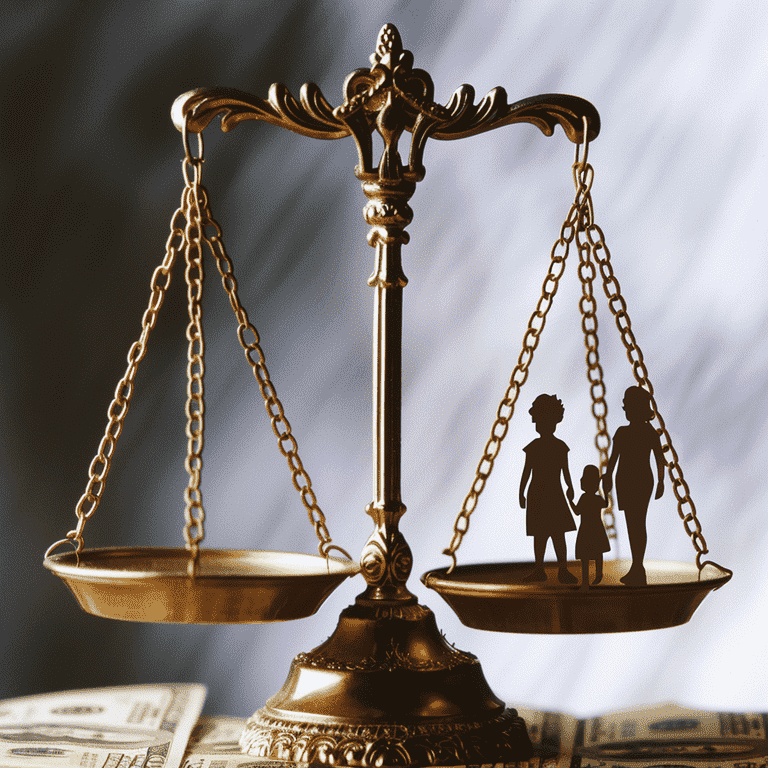Navigating family law can be challenging, especially with new changes each year. In 2023, Nevada introduced several significant updates to its family law system that could impact many residents. Whether you’re dealing with a divorce, child custody, or any other family law issue, it’s crucial to understand these changes to protect your rights and make informed decisions.
This article will summarize the most essential changes in Nevada family law in 2023. Our goal is to keep you informed and prepared.
Recent Amendments to Nevada Family Law
The 2023 legislative session brought several critical amendments to Nevada’s family law. These changes reflect ongoing efforts to adapt the law to better meet modern families’ needs. The revisions are comprehensive, covering everything from custody and support to divorce proceedings.
Overview of the 2023 Legislative Session
This year’s legislative session focused heavily on family law reform. Lawmakers aimed to make the legal process more transparent, fair, and aligned with the current societal landscape.
Key Areas Affected:
- Child Custody: Changes in how custody is determined and enforced.
- Child Support: Adjustments to calculation and enforcement processes.
- Divorce Proceedings: New rules for filing, property division, and alimony.
- Adoption and Paternity Laws: Revised procedures and protections.
- Domestic Violence: Expanded definitions and stricter penalties.
These areas saw the most substantial changes, and understanding them is vital if you’re navigating the family law system in Nevada.
Changes in Child Custody Laws
Child custody laws often see updates to ensure the child’s best interests are prioritized. In 2023, Nevada made several critical changes to determining and managing custody.
New Custody Guidelines
Nevada’s new custody guidelines are designed to provide more evident standards for judges and parents alike.
What’s New:
- Revised Criteria: Courts now consider a broader range of factors when determining custody, including the child’s preference (if they are of sufficient age) and the mental health of both parents.
- Joint vs. Sole Custody: There’s a stronger emphasis on joint custody arrangements unless evidence suggests it’s not in the child’s best interest.
Impact on Parental Rights
The new laws also affect parental rights, particularly in cases where custody disputes are involved.
Key Changes:
- Non-Custodial Parents: Non-custodial parents’ rights have been clarified, ensuring they have meaningful access and involvement in their child’s life.
- Parental Responsibilities: Both parents are expected to actively participate in their child’s upbringing, with the law discouraging any actions that could alienate one parent.

Modifications to Child Support Regulations
Child support is another critical area that saw updates in 2023. These changes aim to ensure that child support is fair and reflects current economic conditions.
Adjustments to Child Support Calculations
Calculating child support can be complex, and the new guidelines aim to simplify this process while making it fairer for all parties involved.
What’s New:
- Income Consideration: The new rules take a more detailed approach to determining both parents’ incomes. Based on these adjustments, high-income and low-income parents may see different impacts.
- Additional Expenses: Childcare, education, and medical expenses are given more weight in the calculations, ensuring these costs are adequately covered.
Enforcement of Child Support
Nevada has also introduced stricter measures to enforce child support payments.
Key Measures:
- Penalties for Non-Compliance: There are now harsher penalties for parents who fail to meet their child support obligations, including potential jail time for repeat offenders.
- Tracking and Enforcement: The state has improved its tracking systems, making it harder for non-compliant parents to avoid payments.

Updates to Divorce Proceedings
Divorce is never easy, but understanding the legal landscape can make it smoother. In 2023, Nevada introduced several important updates to how divorces are handled in the state. These changes aim to streamline the process, protect both parties, and ensure fair outcomes.
Changes to the Divorce Filing Process
Filing for divorce in Nevada has always required specific steps, but the 2023 updates bring new requirements that could affect how you approach this critical life event.
Key Updates:
- Residency Requirements: Nevada continues to require that at least one spouse has been a resident for a minimum of six weeks before filing for divorce. However, the new changes emphasize stricter proof of residency, such as utility bills or lease agreements.
- Waiting Periods: The waiting periods for certain aspects of divorce, such as finalizing the decree, have been slightly adjusted. For example, couples with children might face a more extended waiting period to ensure all custody matters are thoroughly reviewed.
Property Division Revisions
Property division during a divorce can be one of the most contentious issues. Nevada’s 2023 updates bring clarity to how assets and debts are divided.
New Rules:
- Community Property vs. Separate Property: Nevada remains a community property state, meaning most assets acquired during the marriage are split equally. However, the 2023 revisions clarify what counts as “community” vs. “separate” property, particularly concerning inheritances and gifts.
- Debt Division: Debts incurred during the marriage are also divided equally. However, the new laws offer more protection to spouses who may not have been aware of or benefited from specific debts, like hidden credit card spending.
Alimony and Spousal Support Adjustments
Alimony, or spousal support, can be a lifeline for those adjusting to life after divorce. Nevada’s 2023 updates change how alimony is calculated and awarded.
Revised Alimony Calculation Methods:
- New Standards: Alimony is now more closely tied to the duration of the marriage and the financial needs of both parties. For marriages lasting less than ten years, alimony might be shorter or lower unless there are exceptional circumstances.
- Consideration of Contributions: When determining alimony, the court now gives more weight to non-financial contributions, such as a spouse who stayed home to raise children.
Duration of Spousal Support:
- Changes in Duration: Alimony payments may now be shorter or longer depending on the recipient’s ability to become self-sufficient. If the recipient remarries or enters a new domestic partnership, alimony can be terminated.
- Remarriage or Cohabitation Impact: If the paying spouse proves the recipient is cohabitating with a new partner, alimony may be adjusted or terminated to reflect the new financial support in the recipient’s life.

Adoption Law Revisions
Adoption is a profound decision, and Nevada’s 2023 law updates aim to make the process more transparent and secure for all parties involved.
Changes to the Adoption Process
Adopting a child in Nevada now has new guidelines impacting prospective parents and agencies.
What’s New:
- Prospective Parents: Prospective adoptive parents must undergo stricter background checks and meet certain requirements. These include thorough financial assessments to ensure the adopting family can support the child long-term.
- Agency vs. Private Adoptions: The laws now offer more precise distinctions between agency and private adoptions. Agency adoptions might require more rigorous oversight, while private adoptions have new protections to ensure they are legally sound.
Rights of Biological Parents
The 2023 updates also affect biological parents, particularly regarding their rights during and after the adoption process.
Key Adjustments:
- Termination of Parental Rights: The process for terminating parental rights is now more streamlined but requires stricter proof to ensure the decision is in the best interest of the child.
- Contesting an Adoption: Biological parents who wish to challenge an adoption have a more straightforward path to do so, with specific timelines and requirements outlined to avoid prolonged disputes.
Domestic Violence Protections and Restraining Orders
Domestic violence is a serious issue, and Nevada’s 2023 law changes reflect a commitment to protecting victims more effectively.
Expanded Definitions of Domestic Violence
Understanding what constitutes domestic violence is crucial for both protection and legal action. The 2023 updates expand the definitions to include more behaviors.
Expanded Definitions:
- New Behaviors: The law now includes emotional and psychological abuse, not just physical harm. Actions like stalking, intimidation, and control over finances are recognized as forms of domestic violence.
- Protective Measures: Victims can now seek restraining orders for a broader range of behaviors, offering better protection against various forms of abuse.
Stricter Penalties for Violators
Penalties for violating domestic violence laws have become tougher under the new legislation.
Stricter Penalties:
- Increased Consequences: Violators of restraining orders may face longer jail sentences and higher fines, especially if repeat offenses are involved.
- Support for Victims: The state now provides more resources, including more accessible access to shelters, counseling, and legal assistance.

Impact on Same-Sex Couples and LGBTQ+ Families
Nevada has been progressive in recognizing the rights of same-sex couples and LGBTQ+ families. The 2023 updates continue this trend, offering more protections and addressing unique legal challenges these families may face.
Recognition and Rights of Same-Sex Couples
The legal landscape for same-sex couples has evolved significantly, and Nevada’s latest changes reflect this ongoing progress.
Key Protections:
- Custody and Parenting Rights: Same-sex couples now have more explicit rights when it comes to child custody. The law recognizes both parents equally, regardless of biological connection, ensuring both have a say in the child’s upbringing.
- Spousal Support: Same-sex couples are entitled to the same spousal support considerations as heterosexual couples. The 2023 updates ensure that alimony and financial support are calculated relatively, without discrimination.
Additional Considerations:
- Estate Planning: Same-sex couples must understand how these laws impact estate planning. With the updated regulations, legal documents like wills and powers of attorney must reflect these changes to avoid potential disputes.
Legal Challenges and Considerations
While the laws have become more inclusive, same-sex couples and LGBTQ+ families may still face unique legal challenges.
Challenges to Consider:
- Parental Rights Disputes: Disputes may arise in cases where one parent is not biologically related to the child. The 2023 updates offer more clarity, but it’s essential for couples to establish parentage legally through adoption or other legal means.
- Healthcare Decisions: For LGBTQ+ couples, making healthcare decisions for each other can be complicated without proper legal documentation. The new laws emphasize the importance of having clear, legally binding documents to respect your wishes.
Resources and Support:
- Legal Assistance: Nevada offers various resources for LGBTQ+ couples seeking legal advice or assistance. These include legal clinics, LGBTQ+ advocacy groups, and family law attorneys specializing in these issues.
- Support Groups: Connecting with local LGBTQ+ support groups can provide emotional support and practical advice for navigating these legal changes.

Changes in Paternity Laws
Paternity laws determine a child’s legal father and confer significant rights and responsibilities. The 2023 updates to Nevada’s paternity laws aim to simplify the process and protect the interests of both parents and children.
Establishing Paternity
Establishing paternity is crucial for securing legal rights and responsibilities, such as custody, child support, and inheritance.
New Procedures:
- Voluntary Acknowledgment: Parents can still establish paternity voluntarily, but the process has been streamlined. The 2023 updates include more accessible access to forms and explicit instructions on completing the process.
- Genetic Testing: Genetic testing remains the standard in cases where paternity is disputed. However, the new laws provide faster timelines for resolving these disputes, ensuring that decisions are made swiftly to avoid prolonged uncertainty.
Benefits of Establishing Paternity:
- Legal Rights: Establishing paternity gives fathers legal rights to custody and visitation. It also ensures the child can access financial support, health insurance, and inheritance rights.
- Emotional Benefits: Knowing both parents can contribute to the child’s emotional well-being, offering a sense of identity and security.
Disputing Paternity
There are times when paternity is questioned, and Nevada’s 2023 updates provide a more transparent framework for resolving these disputes.
Revised Guidelines:
- Timelines: The law now sets specific timelines for disputing paternity. If a man believes he is not the biological father, he must act quickly to avoid legal responsibility for child support.
- Legal Consequences: If paternity is disproven, the man is generally released from legal obligations. However, if paternity was previously acknowledged voluntarily, the court may still enforce specific responsibilities if deemed in the child’s best interest.

Impact on Guardianship and Conservatorship
Guardianship and conservatorship involve taking legal responsibility for someone who cannot manage their affairs. The 2023 updates to Nevada’s laws in these areas bring more clarity and protection for those involved.
New Rules for Guardianship
Guardianship laws have been updated to ensure that the best interests of minors and incapacitated adults are prioritized.
Key Changes:
- Appointment Process: The process for appointing a guardian has been refined to include more thorough background checks and financial assessments. This ensures that only qualified individuals are entrusted with guardianship.
- Responsibilities of Guardians: The new laws clarify the duties of guardians, emphasizing the need to act in the ward’s best interest. Guardians must provide regular reports to the court detailing their care and financial management.
Impact on Minor Children:
- Parental Preference: The law prefers that a parent be appointed guardian if possible. However, if the parent is deemed unfit, the court will appoint a guardian to provide the child the best care.
- Financial Oversight: Guardians managing a child’s estate must now adhere to stricter financial reporting requirements, ensuring that the child’s assets are protected and used appropriately.
Conservatorship Adjustments
Conservatorship involves managing the financial affairs of someone who cannot do so themselves. The 2023 updates bring significant changes to this area.
Revisions to Conservatorship Roles:
- Duties and Authority: Conservators are given more precise guidelines on their duties, including managing finances, paying bills, and making investment decisions. The law now requires conservators to act more transparently, providing detailed accounts to the court.
- Protection Against Abuse: The updated laws include more robust protections against financial abuse. Conservators who misuse funds or fail to act in the ward’s best interest can face severe penalties, including removal and legal action.
Financial Management and Legal Authority:
- Court Oversight: The court now has increased oversight of conservatorships. Regular audits and reports are required to ensure that the conservator manages the ward’s finances responsibly.
- Legal Recourse: If a conservator is found to be misbehaving, the law provides clear steps for removing the conservator and appointing a replacement. This ensures the ward’s financial and personal well-being is safeguarded.

Breaking It All Down
Navigating the complexities of family law is challenging, especially with the new changes introduced in Nevada in 2023. Whether you’re dealing with divorce, child custody, paternity, or guardianship, understanding these updates is crucial to protecting your rights and making informed decisions.
These changes aim to make the legal process more transparent, fair, and aligned with families’ evolving needs. These updates reflect Nevada’s commitment to supporting families in difficult times, from revised alimony calculations to expanded domestic violence protections.
If you’re affected by any of these changes, consulting with a legal professional who can provide personalized advice and guidance is essential. Staying informed and prepared will help you navigate these legal waters with confidence and peace of mind.
Remember, the law is here to protect you and your loved ones. Understanding it is the first step toward ensuring that protection.

Frequently Asked Questions
How often does Nevada update its family law statutes?
Nevada reviews and updates its family law statutes regularly, often during legislative sessions. Significant changes typically occur every few years, but smaller updates or clarifications may be introduced more frequently as needed.
Can I request a modification to my child support or custody arrangement based on the 2023 law changes?
Yes, if your circumstances have changed or if the new laws directly impact your current arrangement, you can petition the court for a modification. It’s advisable to consult with a family law attorney to understand how the 2023 changes might apply to your situation.
What should I do if I believe the other parent is not following the new custody guidelines?
If you believe the other parent is not adhering to the updated custody guidelines, you can file a motion with the court to enforce the custody order. Document any violations and seek legal advice to ensure your concerns are addressed properly.
Are there any changes to how prenuptial agreements are handled in 2023?
The 2023 updates didn’t significantly alter the handling of prenuptial agreements. However, it’s always a good idea to review your agreement with a legal professional periodically, especially after changes in the law, to ensure it remains valid and enforceable.
How do the new domestic violence laws affect obtaining a restraining order?
The expanded definitions of domestic violence in the 2023 updates mean that more behaviors are now grounds for obtaining a restraining order. If you believe you are a victim of domestic violence under these new definitions, you should seek a restraining order immediately to protect yourself.
Does Nevada's 2023 family law update affect international adoptions?
The updates primarily focus on domestic adoptions, but some aspects could indirectly affect international adoptions, particularly regarding the rights of adoptive parents and the procedures for finalizing adoptions. If you’re considering an international adoption, it’s best to consult with an attorney who specializes in this area.
What is the process for establishing guardianship under the new laws?
To establish guardianship under the new laws, you’ll need to file a petition with the court, undergo background checks, and possibly provide financial documentation. The court will then assess the best interest of the individual in need of guardianship before making a decision.
How do I contest paternity under the 2023 updates?
To contest paternity, you would need to file a legal challenge and request a genetic test within the specified timeframe. If the test disproves paternity, the court will generally release you from legal obligations related to child support, unless there are special circumstances.
Are there any special considerations for military families in the 2023 family law changes?
The 2023 updates did not introduce specific provisions for military families. However, existing laws that provide protections, such as the Servicemembers Civil Relief Act (SCRA), remain in effect. It’s important for military families to seek legal counsel to understand how both federal and state laws apply to their unique situations.
Can I still adopt if I have a criminal record under the new 2023 rules?
Having a criminal record does not automatically disqualify you from adopting, but the 2023 updates include stricter background checks. The nature of the offense, how much time has passed, and your rehabilitation efforts will be considered. It’s recommended to discuss your situation with an adoption attorney.
What if I disagree with a conservator's decisions under the new laws?
If you believe a conservator is mismanaging their responsibilities, you can file a complaint with the court. The court may investigate and, if necessary, replace the conservator. The 2023 updates have strengthened the oversight and accountability of conservators to protect those under their care.
How do I know if the new alimony laws apply to my case?
The new alimony laws apply to cases filed after the changes went into effect in 2023. If your divorce was finalized before then, the old laws might still govern your alimony arrangements. However, you can request a review or modification based on significant changes in circumstances.
Are there any changes to how long divorce proceedings take in Nevada?
The 2023 updates have adjusted certain waiting periods, particularly in cases involving children. While the exact duration can vary based on the specifics of your case, some divorces may take longer to finalize due to these changes. Consulting with your attorney can help set realistic expectations for your timeline.

Additional Resources for You from The Rosenblum Allen Law Firm.
If you’re facing a challenging time and need guidance, our lead attorney, Molly Rosenblum Allen, Esq., has created several valuable resources to assist you. These resources are designed to help you navigate various aspects of family law and other legal matters with confidence and clarity:
Las Vegas Family Law Attorneys: Learn more about how our experienced family law attorneys can support you through difficult family matters.
Family Court Las Vegas: Get an overview of the family court system in Las Vegas and how it can impact your case.
Common Law Marriage in Nevada: Understand the nuances of common law marriage in Nevada and whether it applies to your situation.
Name Change Las Vegas: Explore the process of legally changing your name in Las Vegas, and how we can assist you.
Nevada Power of Attorney: Learn how to set up a power of attorney in Nevada to protect your interests.
How to File a Motion in Family Court: A step-by-step guide on filing a motion in family court to ensure your case is heard.
Family Court Mediation: Discover how mediation can be a less adversarial way to resolve family disputes.
Unbundled Attorney: Learn about unbundled legal services and how they can be a cost-effective option for specific legal tasks.
Nevada Adoption: Find out more about the adoption process in Nevada and how we can help you expand your family.
These resources are here to provide you with the information and support you need during difficult times. If you have any questions or need personalized legal advice, don’t hesitate to reach out to us. We’re here to help.

Offsite Resources for You
American Bar Association: The American Bar Association offers a wealth of resources on family law, including articles, legal guides, and tools to help you find a qualified attorney.
National Domestic Violence Hotline: The National Domestic Violence Hotline provides confidential support for individuals facing domestic violence. It offers resources on creating safety plans, legal options, and finding local assistance.
Child Welfare Information Gateway: The Child Welfare Information Gateway is a government resource that provides information on adoption, foster care, and child protection. It’s a great resource for those involved in or considering adoption.
AARP: The AARP offers valuable information for older adults and caregivers, including resources on guardianship, estate planning, and caregiving.
Parents, Families, and Friends of Lesbians and Gays (PFLAG): PFLAG is an organization that supports LGBTQ+ individuals and their families. It provides resources on legal rights, family support, and community connections.
National Center for Lesbian Rights (NCLR): The NCLR provides legal resources and advocacy for LGBTQ+ families. They offer guidance on issues such as adoption, custody, and family law.
Autism Speaks: Autism Speaks offers resources and advocacy for families affected by autism. This includes information on special education, legal rights, and support services.

A Special Message from Our Lead Attorney, Molly Rosenblum Allen, Esq

Dear Reader,
Thank you for taking the time to explore these resources. I understand how overwhelming family law matters can be, and I hope you found the information helpful in navigating your situation. My team and I are here to support you every step of the way.
If you’re ready to take the next step, I invite you to call us at (702) 433-2889. Let’s discuss how we can work together to address your needs and help you move forward with confidence.
Warm regards,
Molly Rosenblum Allen, Esq.
The Rosenblum Allen Law Firm






